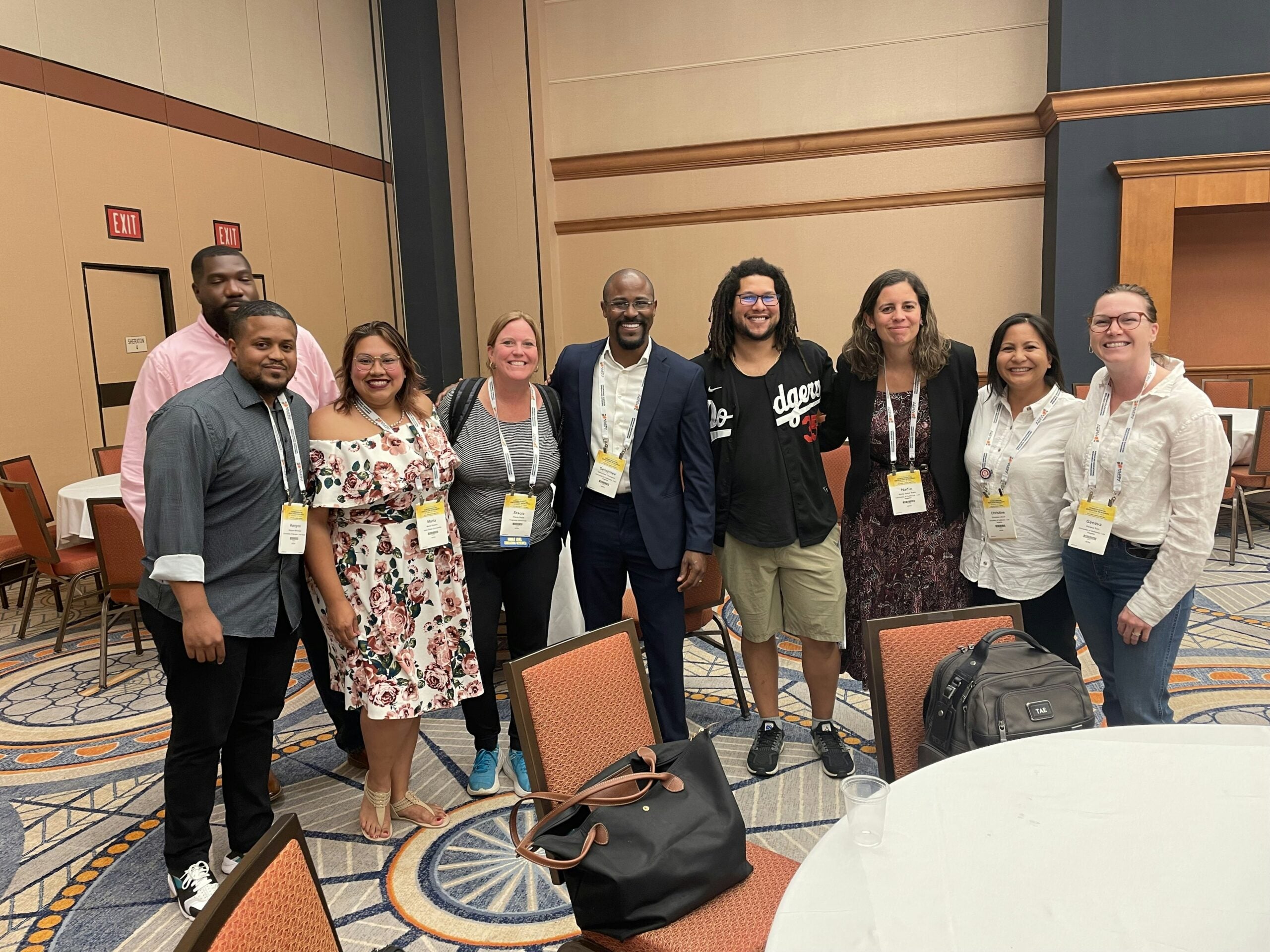From undergraduates to esteemed scholars, representatives of UCLA Ed & IS were everywhere at the annual meeting of the American Education Research Association (AERA) earlier this month in Chicago.
From undergraduates to esteemed scholars, representatives of UCLA Ed & IS were everywhere at the annual meeting of the American Education Research Association (AERA) earlier this month in Chicago. Bringing their Bruin spirit to the “Windy City,” the UCLA team shared their ideas and research, took part in important discussions of critical issues, gained new knowledge, and were honored for their work. The UCLA participants left no doubt about the commitment of UCLA Ed & IS to the development of new ideas, knowledge and practices that strengthen public education and the school’s commitment to equity, diversity, inclusion and justice as central to its strategies for improving education and increasing opportunity for all.
Student Research at AERA
First-year graduate student Lauren Arzaga Daus presented her case study on AAPI high school students in which she argues that while California has established an Ethnic Studies requirement, the needs of AAPI students may go unseen and unmet, and there is a need to ensure teachers are provided the support they need to create and sustain spaces where they and their students can reimagine and cultivate equity, social justice, and liberation in education.
Doctoral candidate Gabriela Corona Valencia shared her work tracing the life of Concepcion Ruiz, a sixteen-year-old Mexican girl sterilized at Sonoma State Home of the Feebleminded in California in 1930, in a study highlighting the impact of eugenic thought and practice in contemporary K-16 public learning environments in East Los Angeles.
“I tried to understand the role of eugenics and the ways in which eugenics plays a very violent role in containing, surveilling and controlling the bodies of Chicana Latina girls. I argue that in in sex education and health, education discourse, this eugenic violence, the same violence that affected Concepcion, continues to impact Chicana Latina girls,” Valencia said.
Recent graduate Tomi Rajninger joined the Momentum team, led by associate director Kate Lehman, to present “Making the Leap: Recent College Graduates’ Early Career Experiences in Computing Fields.” One key finding, “Men reported much higher senses of belonging and identity than women in computing.”
Doctoral candidate Jeffrey Yo examined school level associations between teacher-child closeness and kindergarten students’ math and reading outcomes, as well as the association between these academic outcomes and internalizing behavior.
“We noticed that teacher-child closeness is positively associated with their academic outcomes, Yo said. “But the variance differs by school. And while teacher-child closeness varies by school, the internalizing behavior did not, which may suggest that internalizing behavior may be more fixed within the child, like more (part) of a personality.”
Graduate student Alice Xu presented her work on “Early Identification of Underperforming Students via Reading Patterns. “With these precise measures we can help instructors to help students early on,” said graduate student Alice Xu, discussing her research on “Early Identification of Underperforming Students via Reading Patterns.”
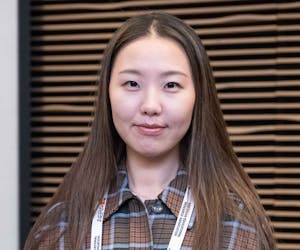
UCLA CRESST undergraduate student Kayla Teng made the case for the education community to study computational thinking and problem-solving in her poster session, “Development and Validation of Game-Based Indicators of Computational Thinking in a Block-Based Programming Game.”
Countering deficit-oriented perspectives of foster youth, doctoral student Demontea Thompson led a lively roundtable discussing his research on the educational journey of foster youth in California. Participants in the study described having to navigate their educational journey with limited or no help. Even though they were confronted by low expectations, many spoke of higher aspirations for educational success and an intent to give back to their communities.
UCLA Ed & IS Faculty and Researchers
Mexican immigrants to the U.S. have long sought, and too often been denied, full citizenship. Their quest to be treated equally and justly, as fully human, endures. In a session exploring the persistent invisibility of Latinx community, UCLA Education Department chair Cecilia Rios-Aguilar joined with co-author Alfredo J. Artiles of Stanford and other colleagues to discuss their research, “Epistemological Invisibility in Research: Implications for Latinx Student Populations 2.0.”
“We need to come together in spaces like these, inside academic spaces and outside … to grasp exactly what this epistemic violence is, how it manifests in our practices in policies and systems, to work on alternatives to face a world that has changed drastically,” said Rios-Aguilar. “We need to move forward to address both invisibility and violence. We don’t want to end here without offering a path forward.”

COVID-19 hit schools and students hard. Assistant professor Anna Markowitz discussed the findings of a new study, “Changes in Children’s Kindergarten Readiness in the Wake of COVID-19: Statewide Evidence From Louisiana.” Among the findings: Between 5-15% fewer kindergarteners met readiness benchmarks across multiple areas after schools closed in 2020, with the largest declines in literacy, mathematics, and physical development. And readiness drops were higher among Black children than white children across all domains except mathematics, and higher among Hispanic children than white children in social-emotional development. The study provides some of the first evidence of pandemic-linked changes in young children’s learning and development, and provides a fuller picture of the challenges children, families, and schools may face in the coming years.
UCLA Diversity Program Consortium project scientist Ana Romero and investigator Krystle Cobian led a packed roundtable discussing their paper exploring the complexities of financial support for students in grant-funded STEM training programs. They contend that Building Infrastructure Leading to Diversity (BUILD) funding led to reductions in financial stress and access to career training, but the impact of aid was hampered by limitations in funding and financial aid processes.
Doctoral student Davis Vo made the case for expanding California Community College baccalaureate degree programs (CCB), presenting new research arguing that CCB programs offer the opportunity to concretely provide more accessible, affordable, and place-bound bachelor’s degrees to advance social mobility for racial and ethnically diverse students, and to meet local workforce demands.
Assistant professor Lorena Guillen asked the question, “What does it really look like to prepare teachers of color?” in a roundtable discussion of her research with graduate students JC Lugo and Sara Jasmin Diaz-Montejano titled, “Troubling Curriculum: Critical Awakenings in Social Foundations for Ethnic Studies Teachers.” Their research presented findings from a study of awareness levels among pre-service teachers in a social foundations course designed for ethnic studies teaching and suggests a need for explicit instruction and creating space for “critical awakenings,” with attention to diversity among teachers of color.

Kai Monet Mathews, director of the California Educator Diversity Project in the UCLA Center for the Transformation of Schools (CTS), presented findings on, “The Six Barriers to Racial Equity in Teacher Education Programs,” a study she conducted with Cathy Balfe, CTS research analyst, CTS doctoral student researcher Erika Yagi, and UCLA Education alumni Earl Edwards and Christopher Mauerman. Using the Kohli healthy racial climate model as a theoretical framework, the team identified six barriers to racial equity including compositional diversity, financial burden, capitalistic values, community and culture, curriculum and pedagogy, and testing requirements.
UCLA Teacher Education Program faculty members Jane Kim and Imelda Nava Landeros, and high school teacher Candice Griffin presented their research paper, “Pedagogy of Resistance: STEM+CS Teachers Counter Bias and Discrimination in STEM and Computing Education.” Plumbing the experiences of four teachers, they explored how STEM and computer science teachers with marginalized identities push back against discrimination and biases in STEM and computing spaces.
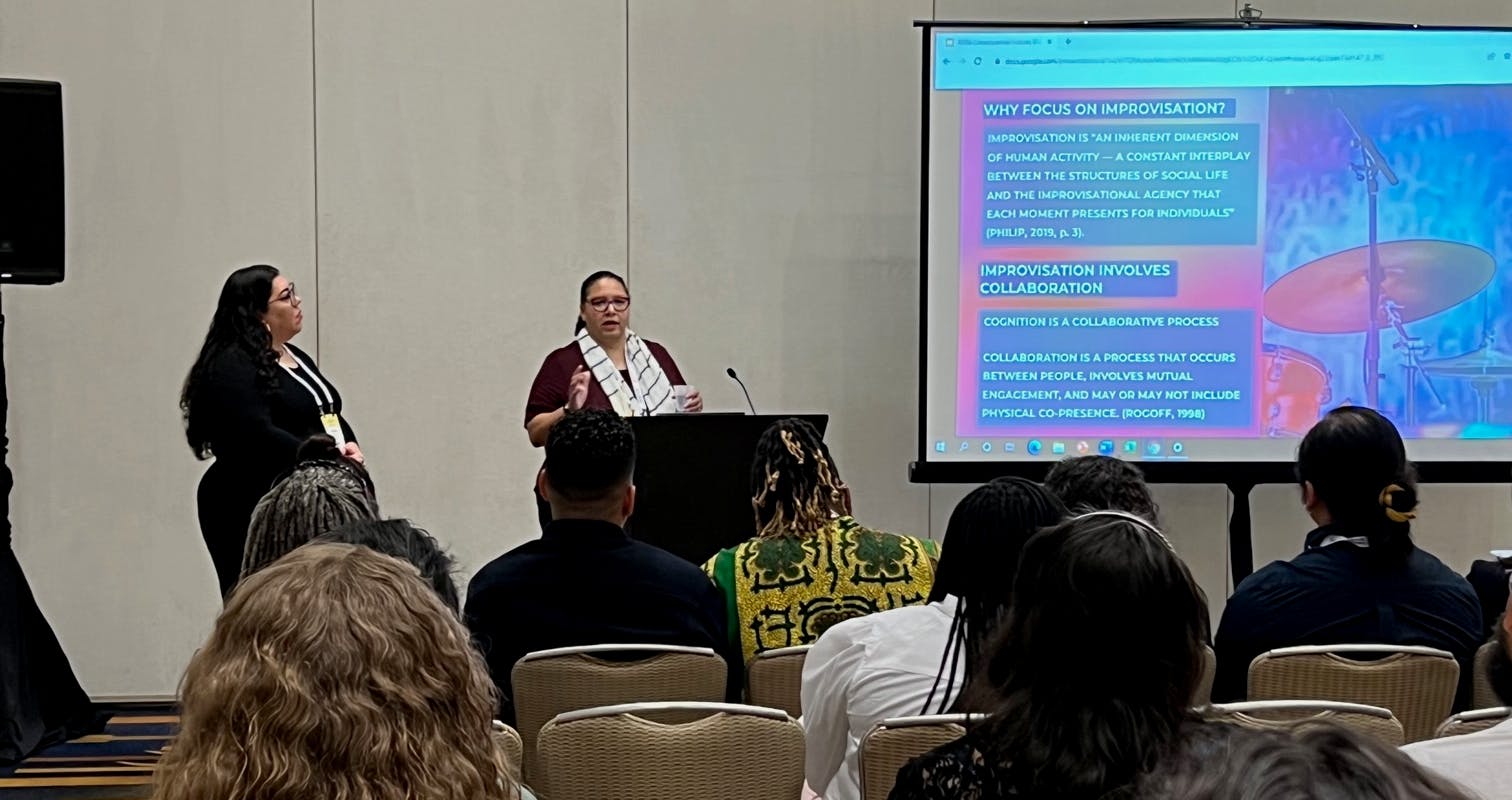
Associate professor Ananda Marin and Brenda Lopez, research associate and media coordinator at the UCLA Center for Critical Race Studies in Education, presented their study on “Freedom Dreams Nested Within the Small Stories of Improvisational Jazz Artists,” in an AERA Vice-Presidential Session on “Consequential Futures: The Contested Pursuit of Truth in Freedom Dreaming.” Their study, conducted with doctoral student researcher Lindsay Lindberg, explored where and with whom do creative artists develop their expertise, how the arts serve as a nexus for social, political, and ethical discourses, particularly in regard to education, and how freedom dreams often germinate in collaborative and improvisational contexts.
UCLA alumnus Mike Hoa Nguyen, now an assistant professor at NYU’s Steinhardt School of Culture, Education and Human Development, chaired the symposium, “Asian American and Native American Pacific Islander–Serving Institutions: Honoring the Past, Examining the Present, and Imagining the Future,” which featured the perspectives of fellow Bruins, Cynthia Alcantar, now an associate professor and director of Higher Education Administration at Loyola Marymount University, and doctoral student Rikka Venturanza.

Tackling Tough Issues
Professor of education and AERA Council member Daniel Solórzano shared his journey as a scholar of Critical Race Theory in an invited speaker session on “Censorship? Indoctrination? Erasure? Critical Race Theory in Teaching and Teacher Education.” The director of the UCLA Center for Critical Race Studies in Education, Solórzano offered a working definition of critical race theory in education, including its five tenets of centering race and racism; challenging dominant frameworks – particularly cultural and genetic deficiency frameworks; centering experiential knowledge; a commitment to social justice; and utilizing an interdisciplinary frame.
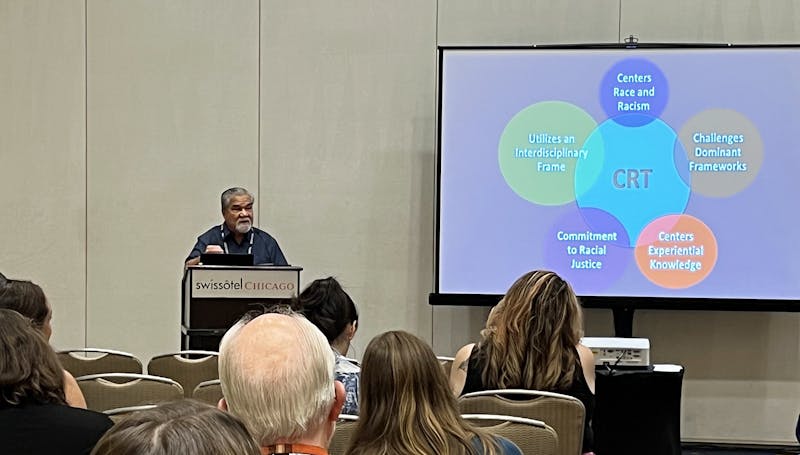
In an AERA Presidential Session chaired by UCLA Professor of Education Tyrone Howard on “The COVID Effect: Rethinking Learning, Data Systems, and Truth for Justice,” associate professor of education and co-faculty director of the UCLA Center for the Transformation of Schools (CTS) Lucrecia Santibañez and Joseph P. Bishop, CTS executive director, presented their findings on, “School Climate Data Pre and Post-COVID: Student and Educator Perspectives in Pursuit of Education Justice.” Santibañez shared data making clear that student engagement, behavioral indicators, and absenteeism have worsened following the pandemic. She urged researchers to have some understanding and empathy for the scope of the pandemic’s impact, suggesting we need to “restore schools in a more humane way.” Sharing research on educator perspectives on the effects of COVID, Bishop’s presentation made clear that gaps in achievement patterns for students of color are accelerating, the social, emotional and mental health needs of students far exceed the capacity of schools, and the basic needs of students are more fundamental to learning than before, arguing that an aggressive state policy response is needed to support racial justice and equity. Thomas Dees and Susanna Loeb of Stanford, Andrew Ho of Harvard, and Janelle Scott of UC Berkeley also took part in this session that one conference attendee said, “was ‘like you asked ChatGPT: ‘create the education research version of The Avengers.’”
Gary Orfield, co-director of the Civil Rights Project/Proyecto Derechos Civiles at UCLA, served as discussant for an invited speaker session titled, “Will the Supreme Court Re-segregate Our Colleges? Amid Troubled Waters, Can Research Show the Way?”
“Without race-conscious policies, we will have segregation and inequality and re-segregation,” Orfield said. “Whatever the Supreme Court decides, if they decide that all race-conscious policies are unconstitutional, anything that’s a positive and obvious race-conscious policy will be considered as potentially discriminatory, and subject to serious sanctions. And, it will be a potentially disastrous intellectual and social loss for institutions.
“As researchers, we need to think about race consciousness,” continued Orfield. “This is something that academics can do something about. Those of us who are researchers, we can show those facts. We can present them to the people that need to hear them, we can present them to the public in any forums that we have. We can bring them to consideration inside our institutions. And those of you who are in this room or listening to this or thinking about this line of work, need to be part of that process.”
As part of the session, UCLA alumna OiYan Poon, a program officer at the Spencer Foundation, a visiting professor at the University of Maryland at College Park, and an associate professor affiliate at the Colorado State University School of Education, also presented her findings on, “Expanding Research on Race, Asian Americans, and Education Equity.”
Jean Ryoo, director of research for the Computer Science Equity Project in UCLA’s Center X, and Professor Sandra Graham made the case for the pursuit of educational equity in the Division C Equity and Inclusion Session, “’Allow Me to Reintroduce Myself’: Doing Equity Work in Ways That Disrupt Systemic Oppression and Empower Marginalized Groups.” The session discussed scholarship on equity perspectives and how members of the academic community can operationalize critical equity perspectives within their research, teaching, and practice.
“We’re just trying to make the world a better place for people,” Professor Graham said. “I always say that I think what I do is use basic research as contributing to knowledge, but it’s always with the goal of improving the lives of [the] marginalized.”
UCLA alumna Tunette Powell, an assistant research professor and director of the K-12 Education of the Children’s Equity Project at Arizona State University, and graduate student researcher Brande Otis, presented “Methods Toward Black Freedom Dreaming: Intergenerational Work with Black Families,” in a paper session on “Strengthening the Voice of Black Families in Family, School, Community Partnerships.”
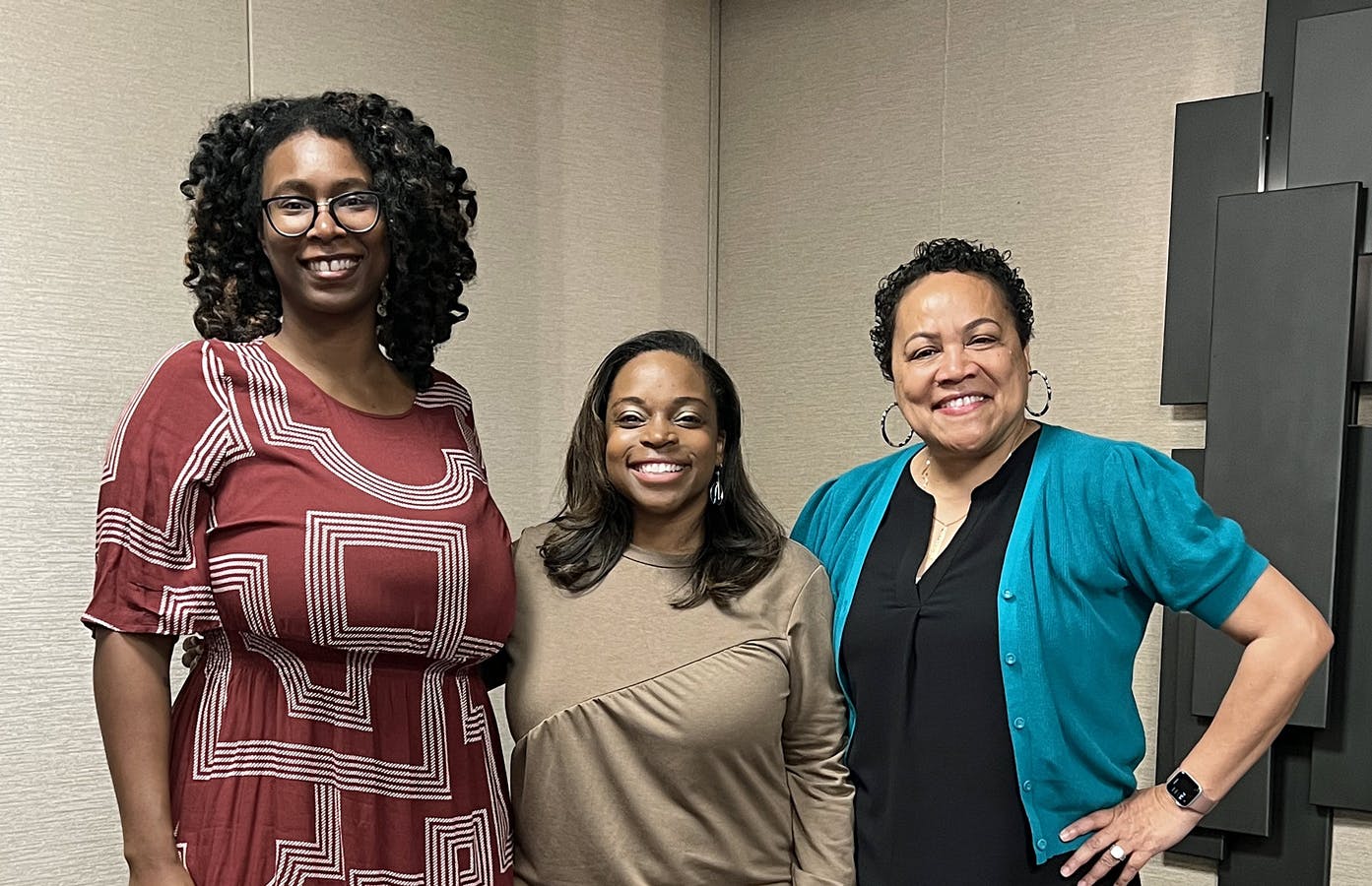
“We cannot ignore the legacy of exploitation and extraction in research for Black folks… and the deficit-based narratives that sort of circulate [around] Black families in research,” said Otis in their presentation. “We want to be here to dream and to imagine new ways of doing research… in ways that honor and resonate with our communities and us.”
Awards and Accolades
Newly appointed AERA president Professor Tyrone Howard was honored at AERA with the 2022 Social Justice in Education Award for his work in making the connections between educational research and social justice. The co-faculty director of the UCLA Center for the Transformation of Schools and the director of the UCLA Pritzker Center for Strengthening Children and Families, Howard is also the founder and director of the Black Male Institute at UCLA.
Other awards recognizing UCLA Education faculty and alumni include: Patricia Gándara, UCLA professor and co-director of the Civil Rights Project/Proyecto Derechos Civiles at UCLA, was honored with the AERA Bilingual Special Interest Group Lifetime Achievement Award in recognition of her outstanding contributions to field. Gándara is a research professor of education and an elected AERA Fellow and of the National Academy of Education. In 2011, she was appointed to President Obama’s Commission on Educational Excellence for Hispanics, and in 2015, she received the Distinguished Career Award from the Scholars of Color Committee of AERA.
UCLA Education Professor Sandra Graham received the Sylvia Scribner Award, given annually by AERA Division C to scholars in the field of learning and instruction in recognition of outstanding scholarship and contributions. The award recognizes a program of work that has significantly influenced thinking and research in the field of learning and instruction. Graham is a professor in the Human Development and Psychology division in the Department of Education at UCLA and the University of California Presidential Chair in Education and Diversity. She was elected to the National Academy of Education in 2015 and is a principal investigator on grants from the National Science Foundation and the National Institute of Child Health and Human Development (NICHD).
Tara Yosso (’00, PhD, Urban Schooling) was honored with the AERA Division G Distinguished Contributions to Social Contexts of Education Research Lifetime Achievement Award, recognizing a senior scholar who has made distinguished contributions to the systematic examination of the role of social context in education. Yosso is a professor at the UC Riverside Graduate School of Education. Her research and teaching examine educational access and opportunity centering on race, history, and culture, utilizing the frameworks of critical race theory and critical media literacy to examine educational access and opportunity.
Editor’s Note: Apologies to those whose sessions we may have missed – just too many great sessions to attend.
